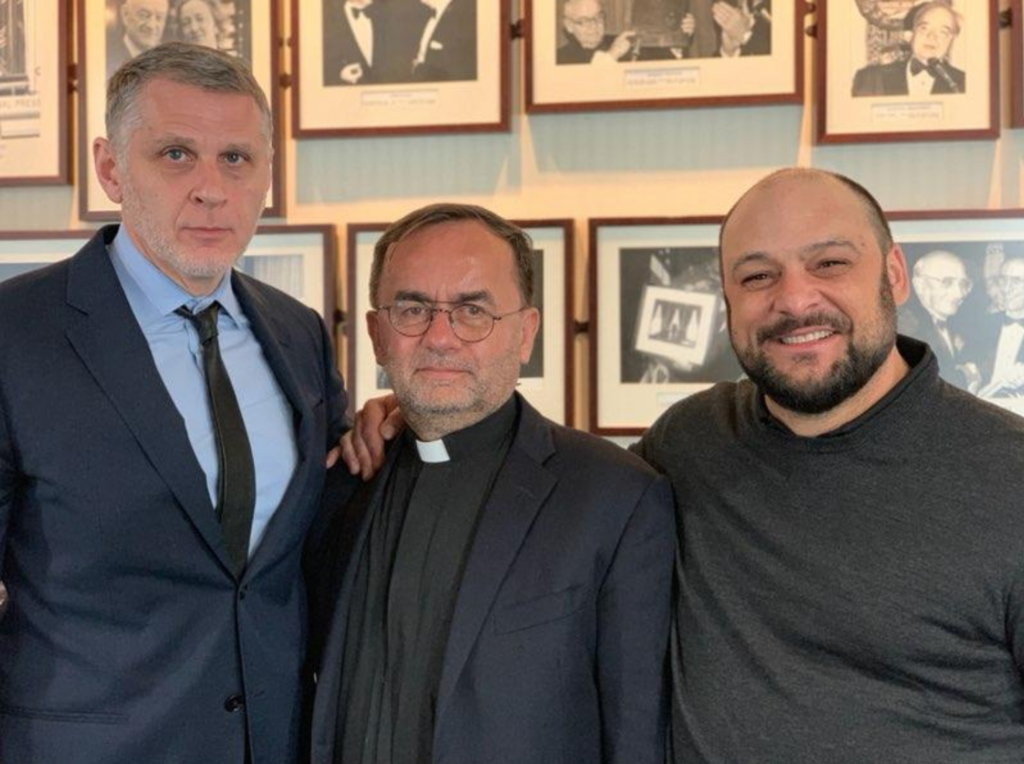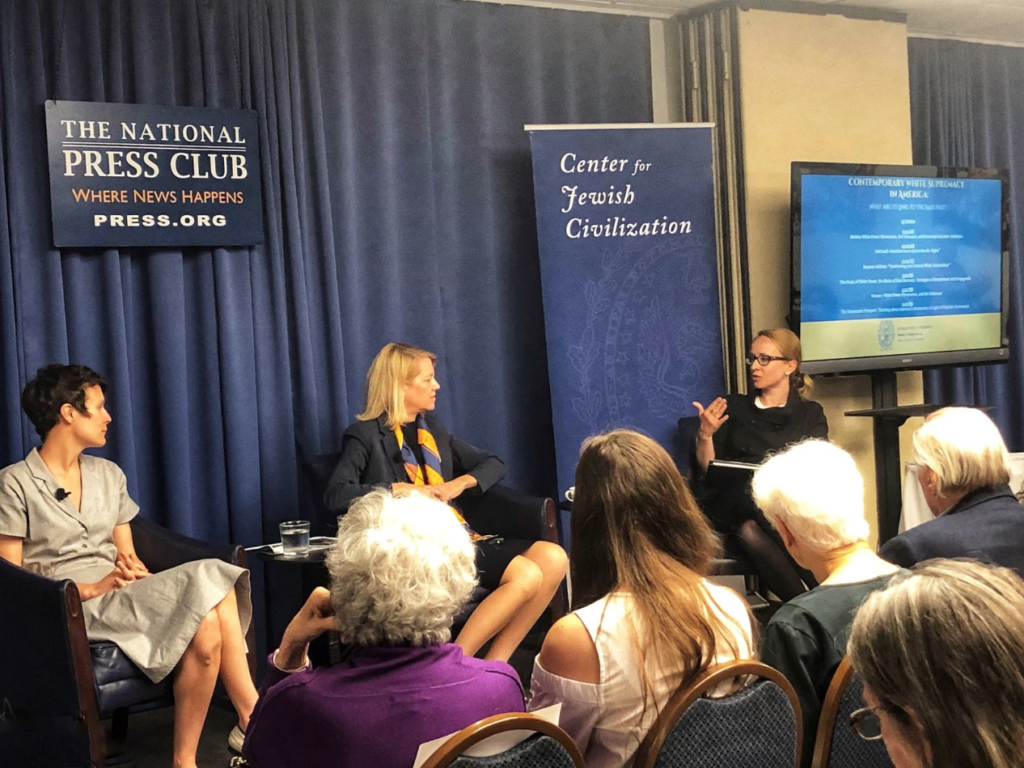Contemporary White Supremacy in America: What are its links to the Nazi Past?
On Wednesday, April 10, the Center for Jewish Civilization hosted at the National Press Club its premiere Spring conference. This year’s event was titled “Contemporary White Supremacy in America: What are its links to the Nazi Past,” and featured a number of academics and practitioners. Notable speakers included Christian Picciolini, Kristen Clarke, and Seyward Darby.
The event kicked-off with a conversation between Father Patrick Desbois, the President of Yahad-In Unum, and Christian Picciolini, the co-founder of Life after Hate and the author of White America Youth: My Descent into America’s Most Violent Hate Movement—and How I Got Out. The conversation was moderated by CJC’s Director Jacques Berlinerblau.

Both speakers brought unique perspectives from their work and lives, covering topics from white supremacy in America to extremists movements such as ISIS. Father Desbois offered the perspective of a historian and forensic expert, drawing from his extensive years of research spent recording the oral histories of the Holocaust by Bullets and his additional work interviewing victims of the Yazidi genocide. Christian Picciolini, as a former skinhead, drew upon his past experiences and current-day work in de-radicalizing white supremacists. Though their combined work spanned regions and decades, the similarities they illustrated between different extremist movements was particularly interesting. One notable moment was when Picciolini and Desbois discussed how studies into extremist groups have placed too much emphasis on “hate” when analyzing those communities. Extremist groups, though founded on a premise of hate, stay together because of the emotional bonds made between hate-group members through the artificial constructions of “us” versus “them.”
“A pure hate group is a mistake in [the] analysis,” said Father Desbois, to which Mr. Picciolini responded, “Hate is exhausting.”
Christian Picciolini and Father Desbois’ panel was then followed by “Nazi anti-Semitism from 1939 to the Alt-Right.” In that panel, Andrej Umansky, the CJC’s Braman Endowed Fellow of the Practice of the Forensic Study of the Holocaust, joined fellow panelist Norman Goda, the Norman and Irma Braman Professor of Holocaust Studies (University of Florida) for an in-depth discussion that made thematic connections between Nazi Germany and modern neo-Nazi and alt-Right movements of today. Their panel was moderated by Wendy Lower, the John K. Roth Professor History and George R. Roberts Fellow at Claremont McKenna College. Lower is also the author of the acclaimed book Hitler’s Furies: German Women in the Nazi Killing Fields, which reviews the role of ordinary German women on Nazi Eastern Front. During the panel, Norman Goda talked about the relationship between the media and white-supremacist movements, explaining how for white supremacists the connections between anti-Semitism and building a wall at the American southern border is clear in the mind of the extremist, but is difficult to articulate in day-to-day reporting.
During the lunch session, the Center for Jewish Civilization was thrilled to have Kristen Clarke, the President and Executive Director of the National Lawyer’s Committee for Civil Rights Under Law, give the keynote lecture of the conference. Clarke spoke about the work that she and her organization have done in the pursuit of civil rights in her speech titled “Confronting 21st Century White Nationalism.” Clarke also highlighted programs such as Election Protection and the Stop Hate Project, which moves policy into the practitioner sphere by connecting her organization to communities in need.
The afternoon sessions kicked off with a panel on “The Music of White Power, the Music of Nazi Germany: Strategies of Recruitment and Propaganda,” and was moderated by the CJC’s Assistant Professor Dr. Jessica Roda. Kirsten Dyck, an Affiliate Adjunct Professor in the Department of History (James Madison University) and J. Mackenzie Pierce, a visiting fellow at the Mandel Center for Advanced Holocaust Studies at the United States Holocaust Memorial Museum, comprised the panel. Their conversation was an ethnomusicological approach to how music and musical performance was (and is) used as a tool in white supremacist movements.
The penultimate panel of the day, “Women, White Power Movements, and the Holocaust,” was chaired by the Associate Director for the Center for Jewish Civilization, Anna Sommer. She was joined by Seyward Darby, the Editor in Chief of The Atavist Magazine, and Wendy Lower. Their panel covered the role of women in far-right movements and touched upon online communities of women that connect through shared social experiences.

In addition, the panel discussed how women, as a whole, are often integral to social movements–the far-right movement being no exception, regardless of that movement’s normally negative views of women. For some women in white supremacist movements, gender identity matters less than their connection to their race. As Seyward Darby–who in addition to being the Editor in Chief of the Atavist has also interviewed a number of women involved in far-right movements–said, “There’s an impulse to look at the misogyny of white nationalism and assume that women don’t want to be around that…[it] assumes that a woman’s gender is the thing that she’s going to be most protective of. For a white woman, it might be her race.”
The last panel of the day, a fiery discussion about the “The Democratic Prospect: Thinking About America’s Democracy in Light of the Populist Movement,” was moderated by Danielle Pletka, a visiting lecturer at the CJC and the Senior Vice President for Foreign and Defense Policy Studies at the American Enterprise Institute. She was joined Harvard University’s Associate Professor from the Department of Sociology, Bart Bonikowski, and Benjamin Hett, a Professor of History at Hunter College and the Graduate Center at CUNY. Their conversation covered a range of divisive topics, such as global populism and the Trump administration, social perceptions of political movements, and right-wing/left-wing political divides in media.
Closing statements were given by Senior Fellow and Assistant Director for Jewish Civilization, Ira Forman. Forman, who served as the State Department’s Special Envoy to Monitor and Combat anti-Semitism, provided an overview of the days events and the common thematics that the panels had pursued throughout the day. Such thematics included the role of community building in alt-right movements, social media as a platforms for mobilization, and similarities between extremist groups in different countries.
The Center for Jewish Civilization would like to thank all of our panelists and attendees for making this an incredibly successful and engaging conference.
